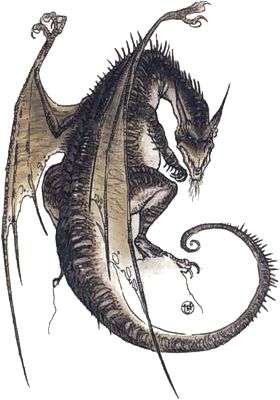

Monstrous Compendium Annual, Volume One

| Climate/Terrain: | Mountains or barrens |
|---|---|
| Frequency: | Very rare |
| Organization: | Solitary |
| Activity Cycle: | Any |
| Diet: | Carnivore |
| Intelligence: | Average to very (8-12) |
| Treasure: | In lair only; see below |
| Alignment: | Chaotic neutral |
| No. Appearing: | 1 |
| Armor Class: | 1 (base) |
| Movement: | 12, Fl 22 (D), Jp 9 |
| Hit Dice: | 11 (base) |
| THAC0: | 9 (base) |
| No. of Attacks: | 4 |
| Damage/Attack: | 2d4(×2)/2d8/3d6 |
| Special Attacks: | See below |
| Special Defenses: | See below |
| Magic Resistance: | See below |
| Size: | G (36’ base) |
| Morale: | Fanatic (17 base) |
| XP Value: | See below |
Fang dragons are greedy, rapacious, and cunning creatures. Their bodies are armored with bony plates that rise into projecting spurs at limb joints and end in long, forked tails tipped with a pair of scythelike bone blades. They fly poorly, but can rise with a single clap of their wings to lunge forward. Their body plates are a mottled gray and brown, their wings are small but muscled, and their eyes tend to be glittering red or orange (other hues are known). Fang dragons’ heads are adorned with many small horns or spikes.
Combat: These dragons have poor magical ability, but they have mastered physical combat. They rake with their claws and slash with their tails for damage, and have an 80% chance to knock down a medium- or smaller-sized victim. Those knocked aside must make a successful Strength check to avoid falling (saving throws for fragile carried items apply) and a successful Constitution check to avoid being stunned for the following round. Also, the victim of any successful claw attack must makt a successful Dexterity check to avoid suffering 1d4 additional damage from the dragon’s body spurs. These attacks are used to clear aside incidental foes and/or pin the main intended victim, whom the dragon then bites.
Fang dragons have excellent vocal control and are able to mimic human voices very effectively as well as use spell scrolls and verbally triggered magical items crafted by humans. They have four small, feeble underclaws that can carry treasure or wield rings, wands, rods, or weapons of dagger size or smaller. They can even perform spellcasting gestures.
Special Abilities: A fang dragon has no breath weapon, but its bite permanently drains hit points if the victim fails to save vs. Breath weapon; drained hit ponts are gained by the dragon. (If the dragon is slain within two rounds per experience level of the drained victim, and the victim ingests or comes into skin contact with some of the dragon’s gore or cranial fluids, the stolen hit points are regained.) This dragon casts spells and uses magic at a level equal to 8 plus its combat modifier.
At birth, fang dragons can detect magic and read magic. They also save vs. all spells cast specifically at them with a +1 bonus. As they age, they gain the following additional powers:
Young: shield twice per day; Juvenile: dispel magic once per day; Adult: spell turning once per day; Old: telekinesis twice per day; Wyrm: regenerate (self only) 1 hp per four rounds.
Habitat/Society: Fang dragons prefer to seek food far from their lairs, which they typically wall up with huge boulders to keep out intruders in their absence. They speak snippets of many languages and will bargain to avoid hopeless or hard battles. They never attack others of their own kind, and they mate once every 60 years or so, parting after a single night
Ecology: Fang dragons eat all manner of fresh meat, especially enjoying the flesh of intelligent mammals. Their fangs (powdered) and their cranial fluids are valued in the making of swords +2, nine lives stealer and similar magical items. Red and fang dragons have an instinctive dislike for each other.
| Age | Body Lgt. (’) | Tail Lgt. (’) | AC | Bite Drain (hp) | Spells W or P | MR | Treas. Type | XP Value |
|---|---|---|---|---|---|---|---|---|
| 1 Hatchling | 3-6 | 3-6 | 4 | 2d4+1 | Nil | Nil | Nil | 1,400 |
| 2 Very young | 6-12 | 6-12 | 3 | 4d4+2 | Nil | Nil | Nil | 2,000 |
| 3 Young | 12-20 | 12-22 | 2 | 6d4+3 | Nil | Nil | Nil | 3,000 |
| 4 Juvenile | 20-32 | 22-36 | 1 | 8d4+4 | Nil | 10% | R | 5,000 |
| 5 Young adult | 32-38 | 36-40 | 0 | 10d4+5 | 1 | 15% | R,S | 7,000 |
| 6 Adult | 38-42 | 40-44 | -1 | 12d4+6 | 1 1 | 20% | R,S,T | 8,000 |
| 7 Mature adult | 42-46 | 44-48 | -2 | 14d4+7 | 2 1 | 25% | Q,R,S,T | 9,000 |
| 8 Old | 46-56 | 48-62 | -3 | 16d4+8 | 2 2 1 | 30% | Q,R,S,T,U | 11,000 |
| 9 Very old | 56-62 | 62-68 | -4 | 18d4+9 | 2 2 2 | 35% | A,B,S,T,Z | 12,000 |
| 10 Venerable | 62-66 | 68-72 | -5 | 20d4+10 | 2 2 2 1 | 40% | A,B,V×6,Z | 13,000 |
| 11 Wyrm | 66-68 | 72-76 | -6 | 22d4+11 | 2 2 2 2 | 50% | A,B×2,V×8,Z | 15,000 |
| 12 Great Wyrm | 68-72 | 76-80 | -7 | 24d4+12 | 2 2 2 2 1 | 70% | A,B×4,V×9,Z | 16,000 |
